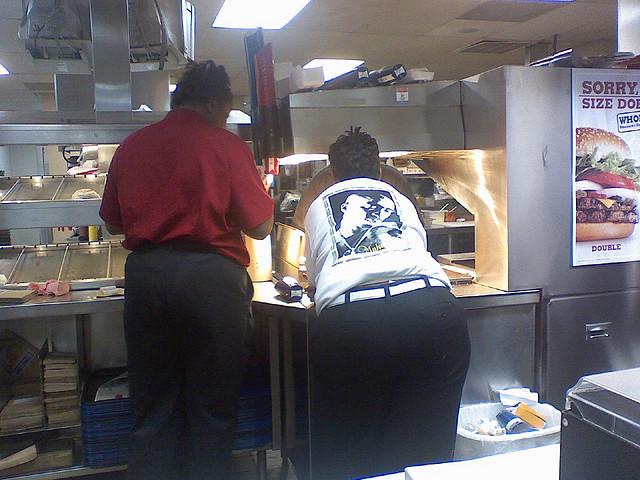Almost all Americana have eaten at a fast food place at some point in their lives. It’s convenient, cheap, and it’s edible enough to satisfy us. However, there’s a lot that people miss when they rush to grab a quick bite. The work and the dedication that goes into producing food rapidly is more extensive than many understand.
There are many different aspects to working fast food. From my experience, it is obvious that without any component of the system, whether it be front counter, drive through, grill, fries, or any other position, the whole thing collapses. The team is absolutely necessary in the fast food industry, which requires getting along with co-workers. This can be extremely difficult at times, but it needs to happen, because the system can not be efficient unless everyone in it is cooperating.
Another aspect, as many people know, is the pay. Fast food workers start at minimum wage ($7.80/hr), and their pay is solely dependent on the amount of time that they clock in for. This time can vary greatly, so if for some reason, a worker’s hours drop dramatically, it could cause serious financial problems. This takes away one of the things people generally look for in a job: stability. However, since getting a job in fast food is relatively easy, it’s a hard, but acceptable, compromise.
From the outside, it doesn’t look too hard; you talk to a cashier, they ring up your order, and two minutes later you have a bag of food. What people need to realize is that it is very easy when there’s only one customer. The thing that makes a fast food worker’s job the hardest and most enduring is the rush: customer after customer coming, ordering food, with nothing stopping the flow of people. Even though it becomes very busy, all the customers still want the same thing with no patient. It takes an intense level of focus, knowledge, and willpower to be able to work through rushes that can last for hours on end, with no break in between. I’ve personally seen people go into nervous breakdowns and need to be removed from the process during a particularly big rush, simply because a couple customers came back and complained about their food.
This segways into the most variable part of serving fast food to people: the people themselves. It is possible to make, ring up, or serve food to more than 100 people in one shift. Every single one of those people comes with a different personality, and some of these personalities are more pleasant than others to deal with. I personally have encountered very unpleasant people, who were just in a bad mood for some personal reason, and felt like taking it out on the one person they knew would be the easiest target: the cashier. There was one instance that I remember, in which a particular customer asked for no onions on their burger. It happened that what they ordered didn’t come with onions, so I told them, “Don’t worry, it doesn’t come with onions.” They proceed to retort with, “Well, why didn’t you just say OK instead of wasting my time?” It takes a significant amount of willpower to keep composure, and to not retort back. However, this isn’t the norm; I’ve encountered my fair share of very nice people as well.
The point of all of this is for people to realize that fast food is more than meets the eye. Next time you’re waiting five minutes at a drive thru, or your burger isn’t quite as hot as you would like it, think twice before throwing a fit over it; fast food workers are people too.








